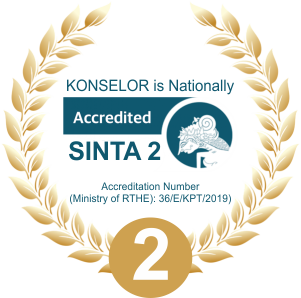Students’ parental socio-economic status, parenting styles and academic performance of secondary school students in ojo local government area, Lagos State
 ), Ireti Tina Odebowale(2), Isioma Olagunju(3),
), Ireti Tina Odebowale(2), Isioma Olagunju(3), (1) Lagos State University, Lagos, Nigeria
(2) Lagos State University
(3) Lagos State University
 Corresponding Author
Corresponding Author
Copyright (c) 2022 Akpezi Benjamin Etobro, Ireti Tina Odebowale, Isioma Olagunju
DOI : https://doi.org/10.24036/02022112115847-0-00
Full Text:
 Language : en
Language : en
Abstract
Keywords
References
Darko, R. (2018). Influence of Parenting Styles on Academic Performance of Senior High Schools in Ghana. International Journal of Research and Innovation in Social Science (IJRISS), vol. 2 (6), 110-117.
Ewijk & Sleegers (2010). The effect of peer SES on students Achievement: A meta-analysis. Journal of Educational Research Review,5 (2). 134-150
Heejung, P., & Lau, A. S. (2016). Socioeconomic Status and Parenting Priorities: Child Independence and Obedience Around the World. Journal Of Marriage & Family, 78(1), 43-59. doi:10.1111/jomf.12247
Majumder, M. A. (2016). The impact of parenting style on children’s educational outcomes in the United States. Journal of Family and Economic Issues, 37(1), 89-98. doi:10.1007/s10834-015-9444-5.
Muzaza, M., Darusalam, G. B. & Ismail, M. I. R., (2017). Parental Socioeconomic Status and Academic Performance of Secondary School Students in the Western Province of the Republic of Zambia. https://www.researchgate.net/publication/319931360; retrieved 13/09/2021)
Obiunu, J. J. (2018). Influence of Parenting Styles on the Academic Performance of Secondary School Students in Ethiope East Local Government Area Delta State. International Journal of Educational Technology and Learning, Vol. 2 (2), 54-58, 2018 DOI: 10.20448/2003.22.54.58.
Ogunshola, F. & Adewale, A. M. (2012). The Effects of Parental Socio-Economic Status on Academic Performance of Students in Selected Schools in Edu Lga of Kwara State Nigeria. International Journal of Academic Research in Business and Social Sciences, Vol. 2 (7), 230-239.¬
Osarenren, N. 2011. Effective Parenting: The Key to Social Change. A Lead Paper Presented at Annual Casson Conference 1st and 2nd November 2011, University of Lagos, Nigeria.
Sopekan 2014. Parenting Styles and Parental Involvement on Pupils Performance in Primary Schools in Lagos and Ogun States. Journal of Early Childhood Association of Nigeria (JECAN) vol. 4 (1) 2014 pg. 51-68.)
 Article Metrics
Article Metrics
 Abstract Views : 593 times
Abstract Views : 593 times
 PDF Downloaded : 192 times
PDF Downloaded : 192 times
Refbacks
- There are currently no refbacks.
Copyright (c) 2022 Akpezi Benjamin Etobro, Ireti Tina Odebowale, Isioma Olagunju

This work is licensed under a Creative Commons Attribution 4.0 International License.







